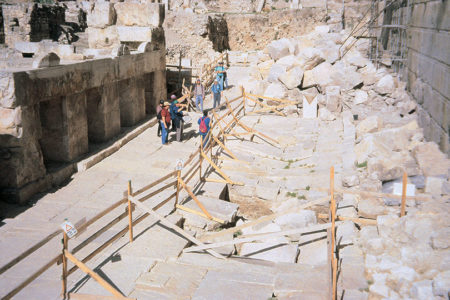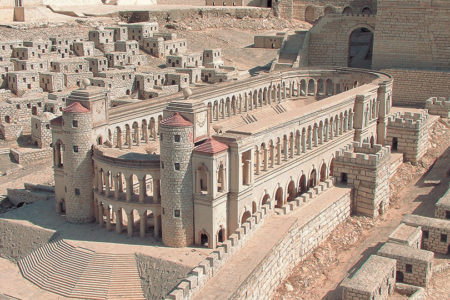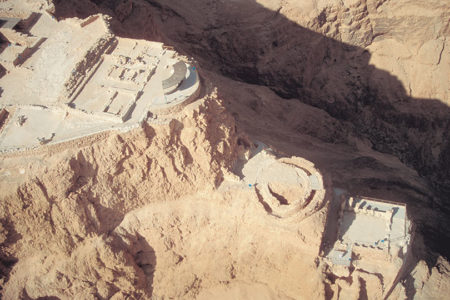God is Sovereign Part Three
Previously we saw that God exercises sovereign rule over the universe, angels, and history. Now we will examine God’s sovereign rule over the nations.
Assertions of Sovereignty. The Bible records assertions of God’s sovereignty over the nations.
God Himself made such assertions. He declared,
This is the purpose that is purposed upon the whole earth, and this is the hand that is stretched out upon all the nations. For the LORD of hosts hath purposed, and who shall annul it? And his hand is stretched out, and who shall turn it back? (Isa. 14:26–27).
The Lord said, “I have cut off the nations, their towers are desolate; I made their streets waste, that none passeth by; their cities are destroyed, so that there is no man, that there is no inhabitant” (Zeph. 3:6); and “I will destroy the strength of the kingdoms of the nations” (Hag. 2:22).
Job stated that God “increaseth the nations, and destroyeth them; he enlargeth the nations, and leadeth them away” (Job 12:23).
King Jehoshaphat insinuated that God rules “over all the kingdoms of the nations” (2 Chr. 20:6).
David wrote, “For the kingdom is the LORD’s; and he is the governor among the nations” (Ps. 22:28).
The Psalms assert, “The LORD bringeth the counsel of the nations to nought” (33:10), “God reigneth over the nations” (47:8), and He “chastiseth the nations” (94:10).
Isaiah declared that, to God, “the nations are like a drop of a bucket, and are counted as the small dust of the balance. . . . All nations before him are as nothing; and they are counted to him less than nothing, and vanity” (Isa. 40:15, 17).
Jeremiah called God “King of nations” (Jer. 10:7) and stated, “The LORD is the true God; he is the living God, and an everlasting king; at his wrath the earth shall tremble, and the nations shall not be able to abide his indignation” (Jer. 10:10).
Relationships of Sovereignty. God’s significant relationships with the nations indicate that He is sovereign over them.
God laid the foundation for the formation of nations by confounding mankind’s language at Babel (Gen. 11). Prior to Babel, the human race had one universal language (v. 1). The building of the city and tower of Babel was mankind’s attempt to unify itself under a one-world system (v. 4). God knew that a unified, one-world system could lead to incredible evil (v. 6). To prevent that event from happening, He fractured the universal language into different languages that were unintelligible to one another (v. 7). God thereby separated mankind into small language groups that He scattered over the earth (vv. 8–9). Nations began to develop on the basis of those different languages.
As the Most High, God determined what portions of the earth the nations were to inherit and set their boundaries (Dt. 32:8; Acts 17:26).
He foretold and brought about the birth of a great nation through Abraham’s biological line (Gen. 12:2). It would be great in significance because, through that nation, God would fulfill His purpose for history and provide the Scriptures (Rom. 3:1–2), the Messiah (Rom. 9:4–5), salvation (Jn. 4:22), and other blessings to all families of the earth (Gen. 12:3; 28:14). That nation is Israel. God declared that He created Israel (Isa. 43:1, 15) and that He created it for His glory (Isa. 43:7).
God forced the mighty nation of Egypt to submit to His will to free the Israelites from slavery (Ex. 1— 15; Neh. 9:9–12).
God preserved the nation Israel through forty years of wandering in the Sinai Peninsula wilderness (Ex. 16—Dt. 34). Centuries later Israel’s leaders worshiped God for this preservation: “Yea, forty years didst thou sustain them in the wilderness, so that they lacked nothing; their clothes became not old, and their feet swelled not” (Neh. 9:21).
Near the end of Israel’s wandering, God revealed how He would deal with it as a nation throughout its history. He would bless it more than any nation if it listened to and obeyed His Word, which He gave it. It would be the head nation, never the tail (Dt. 28:1–14). But if it would not listen to and obey His Word, then many curses would befall it. It would be conquered by foreign nations, removed from its homeland, and scattered among the nations where there would be no rest and life would be precarious (Dt. 28:15–68).
Through this twofold, historic dealing with Israel, God would impress the world with two significant truths about Himself (Dt. 28:10, 37). First, He will bless people who listen to and obey His Word. Second, He will curse those who do not. Thus it is no mistake that in ancient times God placed Israel in the most strategic geographical location on the face of the earth—the crossroads of Africa, Asia, and Europe. And it is no mistake that today Israel is in that same location, where the world’s attention is drawn repeatedly to it.
Just as He promised in Exodus 34:24, God gave Israel marvelous victories over the Canaanite nations in the land He promised to give to the Israelite descendants of Abraham, Isaac, and Jacob (Gen. 12:7; 13:14–15; 15:18–21; 17:8, 19; 26:1–3; 28:13; Joshua; Neh. 9:23–24).
Seven times God raised up foreign nations to chasten Israel when it disobeyed His Word during the period of the judges. And seven times He raised up judges to drive out those nations when Israel repented (Judges; Neh. 9:26–27).
God made Israel a wealthy, powerful, influential nation in the Middle East during the reigns of David and Solomon (2 Sam. 5—8; 1 Ki. 2:12; 3:10–13; 4:20–34; 9:15—10:29).
Because the northern kingdom of Israel persistently rebelled against God from the beginning of its separation from Judah (1 Ki. 12:16—13:34), God raised up Assyria to judge Israel:
O Assyrian, the rod of mine anger, the staff in whose hand is mine indignation. I will send him against an hypocritical nation, and against the people of my wrath will I command him, to take the spoil, and to take the prey, and to tread them down like the mire of the streets (Isa. 10:5–6).
Assyria warred against Israel from 734 to 722 B.C., when the northern kingdom was totally crushed. Many Israelites were killed, and most who survived were carried captive to foreign lands.
Because the southern kingdom of Judah kept reverting to rebellion against God after several revivals, God raised up Babylon, a more wicked nation, to judge Judah (Hab. 1:5–13). God called Nebuchadnezzar, king of Babylon, “my servant” (Jer. 25:9) and said, “I will give all Judah into the hand of the king of Babylon, and he shall carry them captive into Babylon, and shall slay them with the sword” (Jer. 20:4).
Nebuchadnezzar invaded Judah three times beginning in 605 B.C., which began the Babylonian Captivity of the Jewish people. In the third invasion (586 B.C.) he destroyed Jerusalem and Solomon’s Temple. Many Jewish people were killed, and most of those who lived were deported to Babylon (2 Chr. 36:14–21).
Then God raised up Medo-Persia as a great power when the end of the Babylonian Captivity drew near. In prophetic dreams He gave to Nebuchadnezzar (Dan. 2) and Daniel (Dan. 7), God revealed that Medo-Persia would conquer Babylon. Medo-Persia did so in 539 B.C. Cyrus, the Medo-Persian king, officially ended the Babylonian Captivity and commanded the Jewish people to return to their land and build a new Temple (Ezra 1:1–4).
More than 150 years earlier, God had foretold that a man named Cyrus would do this very thing. God said, “Cyrus, He is my shepherd, and shall perform all my pleasure; even saying to Jerusalem, Thou shalt be built; and to the temple, Thy foundation shall be laid” (Isa. 44:28).
After Medo-Persia had served God’s purpose, He raised up Greece as the next great power. More than two hundred years earlier, God had revealed that Greece would conquer the massive Medo-Persian Empire (Dan. 2; 7; 8). By 331 B.C. Greece had done so. Greece’s influence over vast areas of the world was so great that nations adopted its precise, accurate language as a universal language so they could trade with one another. As a result, when it was time for the gospel of Jesus Christ to go to the ancient nations, that universal Greek language enabled people of different languages to understand it. The same is true for the original New Testament, also written in Greek.
After Greece had served God’s purpose, He raised up Rome. Centuries earlier He had revealed that Rome would replace Greece as the next world power (Dan. 2; 7). As Rome systematically conquered areas of the Grecian Empire, it gained rule over Israel in 63 B.C. God used a Roman decree as His means of having the Messiah born in Bethlehem in fulfillment of a prophecy delivered some seven hundred years earlier (Mic. 5:2; Lk. 2:1–7). Roman crucifixion was God’s means of fulfilling the prophecy delivered about one thousand years earlier concerning the method of the Messiah’s death (Ps. 22:1–18; Mt. 27:22–50). Rome’s extensive road system and jurisdiction over the Mediterranean Sea made travel for the spread of the gospel and Scriptures safe and easier.
In “the latter years” and “latter days,” God will bring Gog, of the land of Magog; his army; and a massive, multinational military force against Israel (Ezek. 38:1–16). God will respond to that invasion of Israel with fury and wrath (Ezek. 38:18–19). He will destroy the invaders through a great earthquake, landslides, collapsing structures, soldiers killing each other in panic, pestilence, torrential rain, great hailstones, fire, and brimstone (Ezek. 38:19–22). God thereby will impress the nations and Israel with His greatness and uniqueness so that they will know Him (Ezek. 38:16, 23; 39:21–22).
Near the end of the Tribulation, God will play a role in drawing the rulers and armies of all nations against Israel (Zech. 12:2; 14:1–2). Thus He will (1) bring Israel to repentance regarding its Messiah (Zech. 12:10—13:1) and (2) administer His wrathful judgment on the rulers and armies of all nations through the Messiah at His Second Coming (Joel 3:9–17; Zeph. 3:8; Zech. 12:2–9; 14:3–4, 12–15; Rev. 19:11–21).
Conclusion. God’s sovereign dealings with Israel and other nations has demonstrated that He has the authority and power to raise up, empower, and bless nations, but also to destroy their strength, curse, and cut them off. Thus any nation that does not genuinely acknowledge that the God of the Bible exists and does not heed and obey His revealed Word may be a candidate for judgment. Even if it draws near to God with its mouth and honors Him with its lips but keeps its heart far from Him, it has no right to expect blessing (Mt. 15:8–9).






